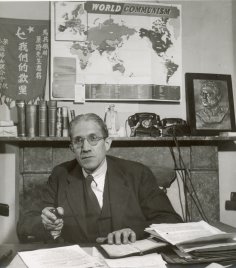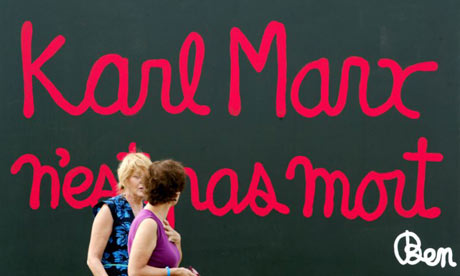Stalinism
Nationality’s role in social liberation: the Soviet legacy

Painting slogans for the Congress of the Peoples of the East, September 1920, Baku. Photo from IISG.
By John Riddell
July 21, 2011 -- http://johnriddell.wordpress.com, posted at Links International Journal of Socialist Renewal with the author's permission -- Just under a century ago, the newly founded Soviet republic embarked on the world’s first concerted attempt to unite diverse nations in a federation that acknowledged the right to self-determination and encouraged the development of national culture, consciousness and governmental structures. Previous major national-democratic revolutions – in Britain, France, Germany, Italy, the United States – had been made in the name of a hegemonic nation and had assimilated, marginalised or crushed rival nationalities. The early Soviet regime, by contrast, sought to encourage, rather than deny, internal national distinctiveness.
Paul Le Blanc: Marxism and organisation
By Paul Le Blanc
The Communist Women’s International (1921-26)

"Emancipated woman -- build up socialism." Poster by Strakhov-Braslavskij A. I., 1926.
By John Riddell
June 12, 2011 -- The following working paper was presented to the Toronto conference of Historical Materialism on May 16, 2010. It first appeared on John Riddell's blog and is posted at Links International Journal of Socialist Renewal with the author's permission.
* * *
When we celebrate International Women’s Day, we often refer to its origins in US labour struggles early last century. Less often mentioned, however, how it was relaunched and popularised in the 1920s by the Communist Women’s International. Moreover, this movement itself has been almost forgotten, as have most of its central leaders.
The Communist Women’s International was founded by a world gathering of communist women in 1921, which elected a leadership, the International Women’s Secretariat, reporting to the executive of the Communist International, or Comintern. It also initiated the formation of women’s commissions in national parties, which coordinated work by women’s bodies on a branch level, and called periodic international conferences of Communist women.
Pamphlet: Capitalism and workers’ struggle in China (revised edition)

[For more on China, click HERE.]
By Chris Slee
Preface to the revised edition (2011)
June 6, 2011 – Links International Journal of Socialist Renewal -- There are a number of changes in this edition compared to the first edition (Resistance Books 2010). Most of these changes merely expand on points made in the original, supplying more detail in the text and/or the footnotes. Others take account of new developments in the year since the first edition was published.
The biggest change is in the discussion of the Great Leap Forward, which has been significantly expanded and rewritten. I felt this was necessary for two reasons. First, I wanted to acknowledge that natural disasters as well as mistaken policies played a role in the reappearance of famine in 1959-61. Second, I wanted to explain in more detail what the policy errors were, and why I consider that Mao was largely responsible for them.
* * *
R. Palme Dutt's 'Fascism and social revolution'

By Graham Milner
In the present situation in the world, with the intermittent resurgence of fascist and neo-fascist movements in some countries, an avowedly Marxist treatment of the subject of fascism, such as Palme Dutt's Fascism and Social Revolution, deserves the attention of new generations of readers.
Rajani Palme Dutt (1896-1974) was born in England of an Indian father and a Swedish mother.[1] He grew up in a political household, where socialism and Indian independence were familiar subjects of discussion. A brilliant scholar at Oxford University (he took a double first), Dutt was a conscientious objector during the World War I, and was expelled from university in 1917 for disseminating Marxist propaganda.
How the Communist Party of Australia exposes the Democratic Socialist Party's 'Trotskyism'
By Doug Lorimer
[This article first appeared in the Democratic Socialist Party's internal discussion bulletin, The Activist, volume 10, number 7, August 2000.]
The Communist Party of Australia has recently published a pamphlet by David Matters entitled Putting Lenin's Clothes on Trotskyism which claims that the DSP's rejection of Trotsky's theory of permanent revolution is really a cover for its support for Trotskyism. However, the real purpose of the pamphlet is to criticise the DSP's position on the 1998 waterfront dispute.
This is made clear in the introduction to Matters' pamphlet by CPA general secretary Peter Symon:
In writing Putting Lenin's clothes on Trotskyism, David Matters has contributed to the task of clarifying ideas and maintaining the validity and truth of Marxism...
The attack on Marxism in the name of Marx, or on Lenin in the name of Lenin, is a particularly pernicious form which can easily mislead those who are not familiar with what Marx, Engels and Lenin actually said and wrote.
The pretension that Trotsky was a great Leninist is one of these misrepresentations and was refuted time and again by Lenin.
Marx-Engels Gesamtausgabe (MEGA2): Has another Marx been revealed?

France, 2010: 'Karl Marx is not dead.'
Tariq Ali on Mao Zedong and communism in China
"Mao images are for sale, popular in China and not just with tourists, hi
Victor Serge: From the defeated past to the expectant future

By Suzi Weissman[1]
[This paper was presented at a conference in Nottingham, England, in 2009. It is posted at Links International Journal of Socialist Renewal with Suzi Weissman’s permission. See also "Victor Serge: `dishonest authoritarian', `anti-worker anarchist' or revolutionary Bolshevik?"]
Workers in the Russian and Cuban revolutions

Fidel Castro addresses a huge crowd in front of the presidential palace in Ha
James P. Cannon: An introduction

[This the introduction to Building the Revolutionary Party: An Introduction to James P. Cannon (Resistance Books: Chippendale, 1997). Dave Holmes is now a leader of the Socialist Alliance in Melbourne. This and other writings are also available at Dave Holmes' blog, Arguing for Socialism.]
By Dave Holmes
James P. Cannon was a pioneer of the Communist Party of the United States and one of its central leaders in the 1920s. Breaking with the Stalinised CP in 1928 he founded the US Trotskyist movement and played the decisive role in building it for over three decades.